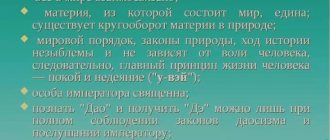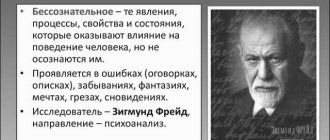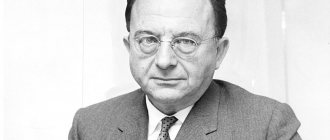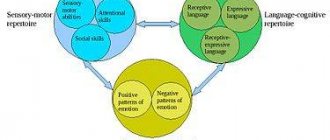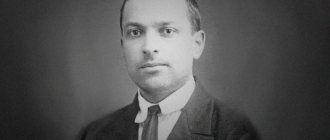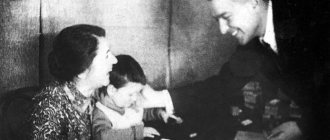Confucius is one of the most mysterious and influential historical figures in the history of the world. Born more than 2.5 thousand years ago on the territories of the collapsed unified ancient Chinese Zhou state, he became one of the first philosophers, whose teachings are important even today for followers of his teachings, historians, as well as statesmen.
Many myths and hoaxes arose around the personality of Kunzi, which is typical for revered and almost deified historical personalities. But besides this, there is enough reliable information about the life history of Confucius that helps to definitely create a portrait of the ancient Chinese sage and philosopher.
As one of the first ideologists of a correct, responsible and partly personalized state machine, “Teacher” became an example for many generations of Chinese bureaucrats, who at all times were distinguished by their work coherence and diligence. The humanistic and, at the same time, state justice-oriented ideology of ethics in state and everyday affairs, developed by Confucius and his disciples, not only became the basis for the viability of large Asian states, but even received the status of a religious movement, although in essence it is not.
To understand what the ideas of Confucius brought to the world, it is worth taking a closer look at his life, teachings and what consequences arose from this.
Birth and meaning of the names of the philosopher
Confucius was born during the internecine wars in China, after the collapse of the Zhou state, when the period of the so-called “middle” kingdoms began - in 552 or 551 BC. According to some studies, the real date of birth (552) was replaced by the disciples of Confucius in order to give it a more sacred meaning.
In the kingdom of Lu, which existed at that time, in which the philosopher was born, a chronicle was kept called “Chun Qiu” (chronicle of “Springs and Autumns”) - from 722 to 481. BC, and from 481 to 221. BC. - the chronicle of “Zhang-guo” (the chronicle of the “Warring States”), which gave the name to the corresponding period in the history of the Ancient Celestial Empire.
The birthplace of the future “Teacher” of all China was the city of Zou in the kingdom of Lu. Today this city has a different name - Qufu, and is located in one of the provinces of the People's Republic of China - Shandong.
The name Confucius comes from the Latin version of one of the philosopher's names: Kung Fu Tzu - Confucius. Sometimes there is a form of the name Kun Tzu, or simply Tzu. It is worth understanding that Zi is only a prefix to his name denoting the term “Teacher,” by which he is known to most admirers.
At birth, Confucius received two names Qiu and Zhong-ni, which respectively mean “hill” and “second of clay,” which is connected with the story of his birth - his mother named him with these names.
When the parents of the future sage learned that they would have a child, they went on a pilgrimage to a holy place to beg the deity of Clay Hill for the birth of a son-heir. After a successful birth near a holy place, the mother awarded the philosopher.
Neo-Confucianism
Neo-Confucianism is a moral, ethical and metaphysical Chinese philosophy. Confucianism had a strong influence on its development. It originated with the Chinese philosophers Han Yu (768–824) and Li Ao (772–841) in the Tang Empire and became popular during the Song and Ming empires.
Neo-Confucianism sought to create a more rational and worldly form of Confucianism. Its creators rejected the mystical elements of Taoism and Buddhism that influenced Confucianism during and after the Han Empire.
Although representatives of Neo-Confucianism criticized Taoism and Buddhism, both teachings influenced this philosophy and terms and concepts were borrowed from both.
Buddhists and Taoists viewed metaphysics as a catalyst for spiritual development, religious enlightenment, and immortality. Neo-Confucianism used metaphysics as a guide for the development of rationalistic ethical philosophy.
Metaphysics is a branch of philosophy that studies the primary causes of abstract things, such as being, cognition, identity, time, space.
Find out what Buddhism is.
Family and background
Confucius' mother Yan Zhizai was the youngest of three sisters in her family. She was born in 568 BC. and at the time of marriage she was not even 20 years old.
The sage's father was an aged military man named Shuliang He. When he decided to get married, according to ancient sources, he was 66 (according to some sources - 63) years old. The reason for the search for a new wife was that Shuliang He had no heirs, and the only available son (Bo Ni, also known as Meng Pi), born of a concubine, turned out to be sick from birth and was not suitable for the role of successor.
One version of the story of the birth of Confucius is the possibility of his birth as the illegitimate son of Shuliang He. The fact is that the marriage of a 60-year-old man with a young girl at that time was perceived as barbaric - it was not customary for such old men to start a new family. Followers of Confucianism deny the version of the “Teacher’s” illegitimate origin, and there is no historical evidence for this theory.
By origin, Shuliang He from the Kun clan was a hereditary Shi - from the class of distant relatives and collateral branches of aristocratic families in China. Researchers searching for the origins of the Kun family learned that it descended from one of the sons of Di Yi, the penultimate of the emperors of the Yin dynasty, who was the ruler of the Chinese state from 1101 to 1076. BC.
Several generations of Confucius's ancestors had fame, wealth and were distinguished by good traditions of education, socio-political and spiritual activities. During the time of Mu Jingfu (great-grandfather of Confucius in the 2nd generation), the Kong family began to be persecuted, after which he disappeared into the territory of Lu, where the family lost its former benefits, fame and influence. Since then, all successors served the rulers of Lu, thus entering the Shi class.
It was from Shi that a layer of the bureaucratic apparatus of the state, distinguished by certain values, grew up in that period. Education, reverence for history and ancient rulers were passed down in Shi families from generation to generation, which also affected the values of Confucius himself.
Chuang Tzu
Zhuangzi's "Tianxia" commemorates the "Book of Changes" and the "Book of Spring and Autumn": as can be seen from all their rules, the contents were passed down from generation to generation through old laws, and much of it can still be found in historical references. What of this was in the Shi-ching, Shu-ching, Li-chi and Yue (is it really the Book of Music, approx), could be learned from the scholars of Tsou (a small principality next to Lu.) and Lu, as well as from members of various courts. The Shi Ching describes what should be the goal of the mind; Shu-ching - course of events; The Li Ching is meant to guide behavior; Yue - establish harmony; Zhouyi to show the action of Yin and Yang; Spring and Autumn to show the names and responsibilities belonging to them.
The above implies two things: firstly, some Books actually existed before the period of Confucius; secondly, the Hexateuch mentioned above cannot be all books. The Shi-ching and Shu-ching were definitely literal documents, but the Li-chi and Yue may be books of practice. All of them were inherited by Confucius and the Zhu school.
Write feedback on this material in the comments to understand whether to continue or not. The author of the translation and listener of the lecture is Alexey Karpov.
Poverty, own family, education
Since Confucius’s father died of old age when his son was only three years old, and his family turned away from his mother, the future philosopher had to live with his mother in poverty throughout his childhood and youth. He spent many years doing dirty work to earn a living.
At the age of 15, the future sage begins to realize the importance of education and begins to study the 5 arts (reading and calligraphy, mathematics, rituals, archery, chariot riding).
At the age of 16, Confucius lost his mother. First, he buried her on the Wufuqu Five Fathers Road, so that later he could bury her next to his father, about the location of whose grave he knew nothing at the time of his mother’s death. Yan Zhizai decided not to tell her son about this. But later Confucius learned about his father’s burial place - near a mountain called Fangshan, after which he transferred his mother’s ashes to him.
At the age of 19, Confucius got married. The marriage produced a son, Lee, and 2 daughters. Confucius had a tense relationship with his son, which is why his students later called their “Teacher” strict and demanding of his own son.
Having mastered the five arts, the little-known future sage receives a position in the Ji clan - to become an accountant and responsible for livestock.
Some writers of that time created a myth that during this period Confucius met with Lao Tzu in the kingdom of Zhou, for which researchers have never found solid historical evidence.
At the age of 27, Confucius received a fairly high position in the kingdom of Lu - in the main idol, and at the age of 30 the philosopher finally had the opportunity to open his own school.
Philanthropy
What did Confucius mean by this concept? In his opinion, to become one, a Chinese must have five qualities of character: to be able to behave with dignity and not get into trouble, to win over a crowd with a broad outlook, to inspire confidence in others, to govern with mercy and to be successful due to one’s own intelligence. But often the great teacher admitted to his students that he could not call himself completely philanthropic. After all, these qualities are just the tip of the iceberg.
The principles of Confucianism have always been broader than it seemed at first glance. The same philanthropy, according to the philosopher, is not only the ability to love and appreciate people. This is not even humanity as recognition of the pricelessness of an individual’s life. Philanthropy includes concepts of responsibility, heritage, worship of traditions and many others.
For example, Confucius once severely condemned a man who, instead of the required three years, mourned his parents for only a year. The philosopher called him immoral and completely devoid of humanity.
School of Confucius
Having opened his own school, the philosopher finally began to implement his basic ideas.
Firstly, he began teaching everyone at his school for a fairly modest fee - a bunch of dried meat. In this way, almost any Chinese could gain access to training.
As reported in historical sources, the total number of students at the school reached 3 thousand. At the same time, it is known about 70 students of Confucius who became his successors along the path of dissemination of ideas that ultimately formed the conceptual basis of Confucianism, which eventually became a religious teaching.
Some sources indicate the number of students as 72, but historians argue that this is only one of many attempts to add symbolism to the philosopher's life story.
Throughout the work of the school, Confucius developed his teachings for a long time, and also tried to find great rulers - “noble men” who could put into practice his approach to good governance.
In addition, historical documents contain information about famous socio-political figures and leaders of individual kingdoms and lands visiting the school.
The basis for building human relationships
Confucius's philosophizing on the topic of relationships between people comes down to creating the most trusting, sensitive human connections. Avoiding conflict situations was not the essence of the treatises. The author sought to idealize a society in which there would simply be no one to conflict with. The philosopher considered each individual person as a member of a large family, where everyone reveres the father (ruler) as the dominant person.
In order to understand and trust each other, you must have such a quality as condescension, that is, the ability to accept and forgive the unwanted attitude of others towards you.
Every person has both noble personal qualities and base ones. The concept of leniency consists of approving the former without noticing the latter. The basic idea about relationships comes down to the following: “When you stand high, be lenient with your subordinates; when you are at the bottom, be lenient with those who laugh at you.”
The Search for Great Rulers
After creating his own school in 522 BC. Confucius turns to various rulers of the Chinese kingdoms who could bring to life his worldview regarding the principles of government. In this regard, Confucius has to travel a lot and become a participant, as well as a victim, of intrigue.
In 517 BC, at the age of 35, the “Master” went to the kingdom of Qi, where he eventually stayed for a couple of years, but in 515 BC. was forced to leave the palace of the ruler of Qi, Jing-gong. The reason for the departure of the ruler of the kingdom of Qi from the court was pressure from the local aristocratic class.
Confucius returned to Lu and, having received a diplomatic post in 500 BC, worked successfully in his post until he was provoked by representatives of the kingdom of Qi while performing one of the rituals of a sacrificial ceremony.
After this, the philosopher left his position at Lee, and in subsequent years he traveled widely. It took Confucius about 14 years to visit different kingdoms. According to research, he walked through at least 9 large courts, communicating with rulers and acting as a mentor.
In addition, Confucius gathered many fans throughout China during this period.
Teachings of Confucius
The main image created by Confucius was that of a teacher who imparts knowledge rather than creates it. In the understanding of the philosopher and his followers, the teachings of Confucianism take their origins from the veneration of antiquity.
Antiquity, as understood by students of the school of the Chinese sage, is the standard of the correct course of action.
This is where some danger lies in the concept of Confucianism regarding the worship of antiquity, since the actions of the legendary rulers of the past are considered true by default, and everything that comes into confrontation with them is false and untrue. Although at the same time, Confucius admits that the main role models - the ancient rulers Yao and Shun - were also not ideal and “perfectly wise,” as recorded in the book “Lun Yu”.
"Lun Yu" is the main text of Confucianism, a book that collected all the main sayings of Confucius related to his teachings.
Confucianism is based on the definition of two types of people:
- Jun Tzu - a noble person, a virtuous husband, a personal standard;
- Xiao Ren is a small, simple person who is unable to understand the teaching.
A Junzi who has the virtues must have five main life qualities, which became the basis for the worldview of the followers of the great sage and teacher.
Government ethics
Since the teaching was primarily supposed to put the affairs of the country in order, it also had a political character based on ethical principles. You must first educate a person, and then everything else, including politics, will fall back into place. We must show greater interest in the soul of the people, the philosopher said. That is, the teaching of Confucius considers the solution of important aspects of the rule of the empire through the prism of society, where the human factor plays a major role.
Time has shown that this really works. The most difficult thing was the following: to force a person to behave as the principles of ethics and morality suggest. People, even those who want to change for the better, cannot immediately turn their inner world upside down. Often this doesn't work out. Others simply don't want to work on themselves. A special approach was required, and Confucius found it. He took advantage of the Chinese ancestor worship. The images of those who passed into another world were more meaningful and real than the abstract sky. It is known that legendary ancestors are role models in China. Confucius himself later became the same symbol of the nation.
Virtues and Principles of Confucianism
The five virtues of a noble man, according to Confucius, also have some relation to the elements, of which there are also 5 in China. Later, after the formation and justification of these virtues, the elements began to be assigned to them.
Ren (philanthropy) is the main virtue in a person, determining his ability to maintain the correct balance of love and hatred. Ren can be defined as the desire for the status quo: not doing to another person what you don’t want done to you. Element - tree.
Zhi (wisdom) is a benefactor that helps a person not only accept knowledge, but also put it into practice. True wisdom, according to Confucius, is possessed only by those who “meditate and learn,” since the first without the second is destructive, and the second without the first is a waste of time. Element - water.
Yi (justice) is a postulate that to some extent balances ren and comes from it. He points out the need to match the external form with the internal knowledge. The element is metal, a symbol of strength, directness, and unambiguity.
Li (ritual) is a benefactor responsible for normative behavior and fulfillment of the regulations according to which society is organized. What is inappropriate should remain outside the boundaries of society; it should not arouse interest. Compliance with ritual is the most important basis for maintaining balance, which also acts as a normative prerequisite for Confucianism, stipulating the importance of the actions of each member of society in his place. Corresponds to fire, the energy of movement and growth of society.
Xin (sincerity) - determines the degree of caution in actions. This postulate anticipates the fulfillment of this word, as well as the need to correct errors. The concepts of shame, joy, or any other natural reaction in Confucianism are indicative. The earth as an element balances li - in order to avoid arrogance and hypocrisy.
Confucianism also formulated several important concepts to complete the concept.
Xiao (reverence) is an important characteristic of a noble husband. Only by honoring elders, leaders, and parents can one become a noble husband and aspire to become a worthy ruler. On the other hand, the parent and ruler must feel fatherly love for the younger ones.
Tian (sky) is the most worthy example of imitation in terms of li ritual. The first imitators were Yao and Shun, who created norms and ritual.
Tao (path) is the right path, ethical, generated by man and heaven. A person’s goal in life is to walk this path.
Zheng-ming (rectification of names) is the most important criterion for assessing a person and his virtues. If a person’s actions correspond to his place in society, then he has the correct name, title. If a person behaves inappropriately, for example, not like a ruler, then he cannot be a ruler. Here the thoughts of the apologists of Confucianism are intertwined with the postulates of meritocracy. The importance of zheng-ming in the teachings of Confucius was even evident in the way he selected his disciples.
Five Constants
Every person should strive for a righteous life. To do this, it is necessary to follow certain moral duties. “Ren” is the opposition to savagery and animal aggression. Following this, people abandon cruelty in favor of compassion and love. The symbol is the Tree.
“And” is justice and truthfulness. It acts as a counterbalance to selfishness, imparts rigor and firmness. Parents should be honored as a thank you for their care. Symbol - Metal.
“Li” is loyalty to customs. Any activity is useful provided that it is aimed at preserving the foundations of society. Symbol - Fire.
“Zhi” is prudence, which reduces stubbornness. Before you take action, you should consider the consequences. Associated with the element of Water.
“Xin” is good intentions that prevent hypocrisy. Sincerity, integrity and ease decorate. Symbol - Earth.
All moral duties are combined with each other, complement and balance. Their development leads to harmony. They merge in the Wen ritual, which means good manners. This cannot be understood as something natural or artificially derived - Confucius believed that this was a combination of natural data and purposeful labor.
The meaning and significance of Confucianism in the East
Confucianism gave rise to centuries-long processes of formation of a powerful ideological background of Chinese society. Also, the philosopher’s teachings went far beyond the Celestial Empire.
The postulates of Confucianism fundamentally contradict Mohism, which preaches “universal love,” offering fair love to society, which makes Confucianism more socialized and less utopian than Mohism.
On the other hand, the concept of the followers of Confucius refutes the need to adhere to the law, which is what supporters of legalism call for. In contrast to the “letter of the law,” one might say, Confucianism opens up broad opportunities for observing the “spirit of the law.”
Becoming the basis for the management approach, the teachings of Confucius radically change the essence of management. Thanks to its influence, it has become the ethical and political normative basis of Chinese society and is asserting itself in its positions, despite all the historical, political and economic changes in the world in general and the Celestial Empire in particular.
Death of Confucius and his legacy
Confucius was buried in his native Qufu in 479 BC. He was 73 when he died, although some researchers are trying to prove that he died at 72 (a sacred number). Despite this, the name of the philosopher will forever remain in the history and memory of mankind.
The collection “Lun Yu” (“Reflections and Conversations”) is today the main source of wisdom of the great Kun Tzu. Many of the books that are attributed to him were not written by him, or there is no reliable information about this.
Since Han times (2nd century BC - 2nd century AD), pilgrims have performed rituals and worship at his grave and in the temple built near it. The life and legacy of Confucius has attracted the interest of the entire population of the planet for the past 2.5 thousand years, and most likely will remain relevant in the future, for at least 6.5 million followers of Confucianism in the world.
At the origins of philosophy
The teachings of Confucius, like other great Chinese religious and philosophical movements, originated in China in the 6th–5th centuries BC. It was at this time that the golden era of the state was replaced by chaos and devastation. The main principle of the empire “who is rich is noble” was violated. People who had nothing to do with the aristocracy had wealth through iron, which they began to actively mine. All this disrupted harmony and provoked civil strife.
Order was to be restored by mass movements and teachings that arose like mushrooms after rain. Some only lasted a couple of decades. Others - Confucianism, Taoism, Legalism - are so firmly embedded in the culture of China that it is simply impossible to imagine today's country without them. Thus, the teachings of Confucius did not arise out of nowhere. During times of devastation and disaster, the great philosopher reflected on the principles and methods that could restore order. And the main way to achieve harmony, in his opinion, was the person himself, his upbringing, morality and behavior.
